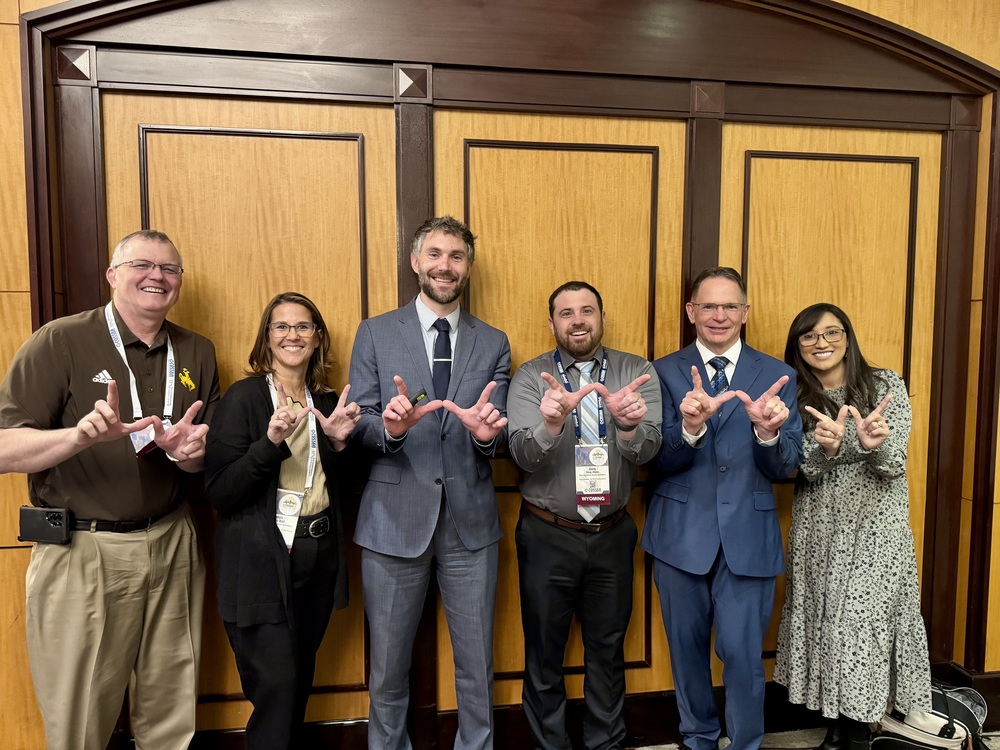Wyoming Public Education Leaders Shine at National School Board Conference
March 22, 2025 – Wyoming – Seven distinguished Wyoming public education leaders recently
took the stage at the Consortium of State School Boards Associations (COSSBA) National
Conference, sharing epic initiatives and educational advancements happening across the state of
Wyoming.
The presentations highlighted Wyoming's leadership in education, showcasing the state’s
commitment to fostering innovative learning environments, providing high-quality instruction,
and achieving exceptional student outcomes. These leaders discussed the state’s dynamic
approach to public education, which emphasizes personalized learning, cutting-edge innovative
instruction and learning, and a focus on academic excellence. These Wyoming professional
educators emphasized Wyoming Public Education is the choice.
Wyoming Public Schools continues to set the standard in education through strong collaboration
among educators, administrators, and local communities. These presentations demonstrate a
continued dedication to ensuring that all students receive a world-class education, equipping
them to succeed in the global economy.
Through their involvement in COSSBA, Wyoming public education leaders further solidify the
state’s national reputation for fostering high levels of learning and transformative educational
practices.
Mike Hamel Superintendent & Tanya Wall, Director of Special Services, Carbon County School
Dist. #1, the presentation focused on how Carbon County School District #1 in Wyoming
successfully transformed student outcomes and achieved higher levels of student achievement.
Mike and Tanya shared their strategies and insights. They shared how the data were both
predictable and replicable, and they explained how to apply these best practices to enhance
student achievement. Participants gleaned knowledge on how to operationalize the highest-rated
practices for impacting student achievement, align evaluation and walk-through instruments with
these practices, and structure an intentional new teacher mentoring program that supports these
practices.
Vernon Orndorff, Superintendent of Park County School District 6, explored the key components
necessary for the successful launch of a district-wide initiative, focusing on the "Classroom 2
Careers" program. The session covered critical elements such as school board leadership,
overcoming barriers, establishing community partnerships with business leaders, gaining
stakeholder buy-in, and creating effective branding and marketing strategies. This work paved
the way for the C2C program. The presentation highlighted the balance between the "science of
teaching" and the "art of teaching." Partnering with local businesses, the district expands Career
and Technical Education (CTE) opportunities for K-12 students, offering hands-on experiences
and internships that connect career pathways to local career opportunities.
Chase Christensen, Superintendent of Sheridan County School District #3, and Joslyn Schiffer-
Camino, Instructional Coach, presented tools and processes to develop a cohesive instructional
framework. The session focused on identifying the most important work, committing to it,
targeting professional development, ensuring fidelity, and building collective efficacy within
school districts. With limited time and resources, the workshop emphasizes the importance of
committing to the right work to dramatically increase student achievement. Participants will
learn why instruction is the most crucial facet of education for a board, how to ensure a
collective approach to instruction, and how to measure success using data to guide future steps.
Doug Hazen, Superintendent of Big Horn County School District #2, and William Hiser,
Principal presentation included a blend of humor, real-world stories, and interactive discussions
exploring the powerful impact of communication, empathy, and a bit of fun in uniting staff
throughout school districts. Attendees discovered practical strategies to build strong
relationships, advocate for student needs, and drive positive change. The session highlighted how
personal connection can transform a district into a supportive, student-centered environment,
enhancing interpersonal skills, promoting student well-being, and driving positive change
through collaboration and effective communication.

